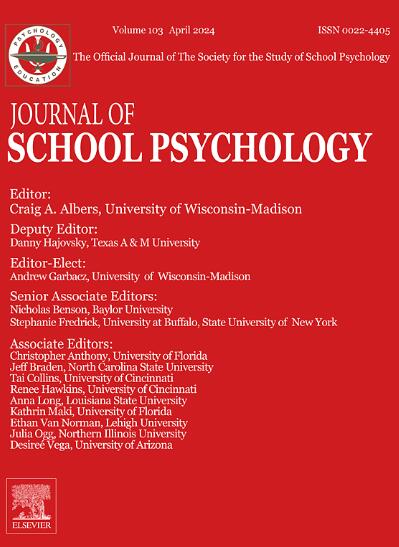同伴伤害、内化问题和对朋友的满意度:青春期个人和班级层面关联的两波分析
IF 4.1
1区 心理学
Q1 PSYCHOLOGY, SOCIAL
引用次数: 0
摘要
长期以来,人们一直认为同伴伤害是青少年中的一个重要问题,可能会对他们的心理和社会福祉造成有害影响。然而,采用纵向、多层次方法来探讨同伴受害动态复杂性的研究仍然缺乏。本研究旨在测试 6 个月内朋辈伤害、内化问题和对朋友的满意度之间的短期纵向联系。样本包括 1299 名 T1 阶段的青少年(48.3% 为女性,年龄 = 13.6 岁),他们在学校的 67 个班级就读。数据是通过在同一学年的两个时间点进行的自我报告问卷调查收集的。多变量多层次分析表明,在个体水平上,T2的受害问题与T1的内化问题呈正相关(方差比例减少[PRV] = 0.7%),与对朋友的满意度呈负相关(PRV = 1.6%),而T2的内化问题与T1的同伴受害问题呈正相关(PRV = 0.7%)。对朋友的满意度受同伴伤害的负向预测(PRV = 3.6%)。在班级层面,秋季对朋友的满意度较低的班级更有可能出现 T2 阶段的受害情况(PRV = 15%)。此外,班级层面的种族多样性也有助于解释班级之间对朋友满意度的差异(PRV = 9.1%)。这些研究结果突出表明,有必要采取干预措施,促进积极的同伴关系,并为受害青少年提供支持,以减少内化问题。此外,这些研究还强调了提高友谊质量作为防止受害的保护因素的重要性。本文章由计算机程序翻译,如有差异,请以英文原文为准。
Peer victimization, internalizing problems, and satisfaction with friends: A two-wave analysis of individual and class-level associations in adolescence
Peer victimization has long been recognized as a significant issue among adolescents, with potentially harmful consequences for their psychological and social well-being. However, studies adopting a longitudinal, multilevel approach to explore the complexity of peer victimization dynamics are still lacking. This study aimed to test short-term longitudinal associations between peer victimization, internalizing problems, and satisfaction with friends over the course of 6 months. The sample included 1299 adolescents at T1 (48.3% female adolescents, Mage = 13.6 years) attending 67 school classes. Data were collected through self-report questionnaires administered at two time-points during the same school year. Multivariate multilevel analysis indicated that, at the individual level, T2 victimization was positively predicted by T1 internalizing problems (proportional reduction in variance [PRV] = 0.7%) and negatively by satisfaction with friends (PRV = 1.6%), whereas internalizing problems at T2 were predicted by peer victimization at T1 (PRV = 0.7%). Satisfaction with friends was negatively predicted by peer victimization (PRV = 3.6%). At the class level, T2 victimization was more likely in classrooms with lower levels of satisfaction with friends in the fall (PRV = 15%). Moreover, class-level ethnic diversity contributed to explain between-class variability in satisfaction with friends (PRV = 9.1%). These findings highlight the need for interventions that promote positive peer relationships and provide support for victimized adolescents to reduce internalizing problems. Additionally, they underscore the importance of fostering friendship quality as a protective factor against victimization.
求助全文
通过发布文献求助,成功后即可免费获取论文全文。
去求助
来源期刊

Journal of School Psychology
PSYCHOLOGY, EDUCATIONAL-
CiteScore
6.70
自引率
8.00%
发文量
71
期刊介绍:
The Journal of School Psychology publishes original empirical articles and critical reviews of the literature on research and practices relevant to psychological and behavioral processes in school settings. JSP presents research on intervention mechanisms and approaches; schooling effects on the development of social, cognitive, mental-health, and achievement-related outcomes; assessment; and consultation. Submissions from a variety of disciplines are encouraged. All manuscripts are read by the Editor and one or more editorial consultants with the intent of providing appropriate and constructive written reviews.
 求助内容:
求助内容: 应助结果提醒方式:
应助结果提醒方式:


